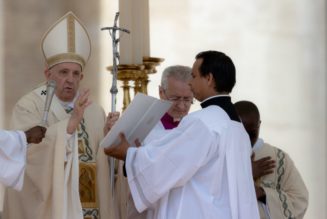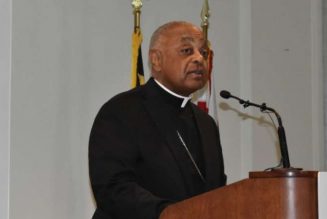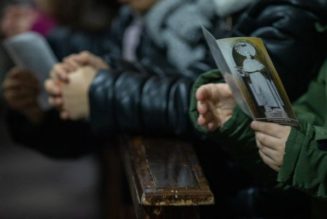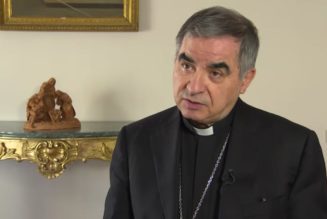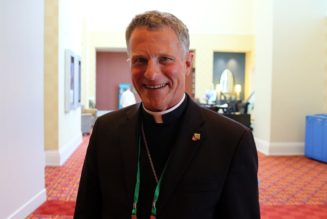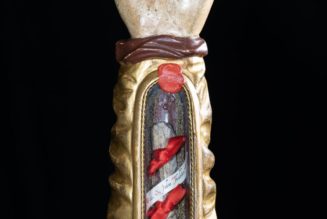As the US bishops face a moment unseen in most of their lifetimes – the nation’s election of a Catholic to the Presidency – the issue of Joe Biden’s faith emerged by surprise at today’s public close of the USCCB plenary, as the bench’s leadership suddenly moved to draw a line in the sand with the incoming Democratic administration over its support of legal abortion.
Five days since the President-elect received a congratulatory phone call from the Pope – during which the two discussed the common causes of “caring for the marginalized and the poor, addressing the crisis of climate change, and welcoming and integrating immigrants and refugees” – while Archbishop José Gomez made a passing nod of hope that Biden’s “faith commitments will move him to support some good policies,” the conference president quickly pivoted to underscore that the new White House “will support policies that attack some fundamental values we hold dear as Catholics… [which] undermine our ‘preeminent priority’ of the elimination of abortion.”
Announcing a working group led by the USCCB vice-president, Archbishop Allen Vigneron of Detroit, and rounded out by several key committee chairs, Gomez said that “when politicians who profess the Catholic faith support” abortion and a concept of religious freedom that allows enforcement of protections for civil rights, “there are additional problems.
“Among other things, [the scenario] creates confusion with the faithful about what the church actually teaches on these questions.”
Much as the election of a Catholic adds a deeply potent aspect to the calculus – and with it, the cited fears of a competing influence over the faithful – there is precedent for an intervention of this kind, but only with a prior Democratic administration.
At its November plenary following Barack Obama’s 2008 election – which, with Biden as his Vice-President, likewise inflamed a sizable bloc of the bishops – the conference approved a statement written by its then-president, Chicago’s Cardinal Francis George OMI, warning that the new administration would attempt to codify the Supreme Court’s 1973 ruling in Roe v. Wade into US law; a move that, some predicted, would result in the closing of Catholic hospitals forced to comply with a legislated abortion mandate.
At the time, the bishops said they “are single-minded” on the issue “because they are, first of all, single-hearted.”
For context, then-candidate Obama signaled that he would sign a proposed Freedom of Choice Act in a speech to Planned Parenthood during the 2008 primary season, but such a bill was never introduced in Congress once he took office. At the time, Democrats notably enjoyed majorities in both houses and a filibuster-proof 60 seats in the Senate.
By contrast, the full bench’s reaction upon President Trump’s 2016 win was palpably more muted. First issued as a statement from the Committee on Migration (as opposed to the conference president) and only subsequently adopted by the entire body, the message focused less on Trump than as a gesture of solidarity with migrants given the former’s incendiary rhetoric and proposals on immigration – a platform which, of course, had already scored an explicit condemnation from the Pope during the campaign itself.
On the whole, today’s statement signals that, while several leading moderate and progressive prelates indicated tacit support for Biden during the campaign despite Trump’s anti-abortion stance, the conference as an institution is preparing to take a more aggressive line toward the incoming administration.
This dynamic reportedly stretched into the closed-door executive session that closed Tuesday’s business. According to Whispers ops, a steady chorus of conservative prelates rose in the private talks to urge a unified opposition to a Biden White House, lest any cooperation with it be perceived as undermining the church’s pro-life witness on abortion.
In practical terms, however, the first test of the coming church-state dynamic might be a matter where the prelates have little choice but to play ball. With plans for a further round of COVID-related economic stimulus effectively dead on arrival in the waning days of the Trump Administration – despite the President-elect urging a stopgap agreement as the pandemic’s biggest wave causes further havoc for workers and businesses – after the springtime CARES Act and its Paycheck Protection Program (PPP) served as a mammoth lifeline allowing a broad range of Catholic entities to survive without mass layoffs or furloughs, the bishops have voiced concerted support for a new round of stimulus, without which no shortage of dioceses, parishes and schools would be forced into insolvency, or significant downsizing at best.
Along those lines, as the first round of PPP funding expired without being renewed, only in recent weeks have several dozen local churches needed to make their most drastic cuts of ministries and staff over the course of the pandemic – a reality which threatens to become ever more widespread as the status quo persists.
Below, the fulltext of Gomez’s statement, the push for which reportedly unfolded over the last 48 hours:
Brothers, the Chairmen of several Committees have come to me recently to express a particular concern in the wake of the election. I had the opportunity to consult with the Executive Committee about this concern, and I found unanimous support for what I am about to present.
We are facing a unique moment in the history of the Church in this country. For only the second time, we are anticipating a transition to a President who professes the Catholic faith. This presents certain opportunities, but also certain challenges.
The President-elect has given us reason to believe that his faith commitments will move him to support some good policies. This includes policies in favor of immigration reform, refugees, and the poor; and against racism, the death penalty, and climate change.
But he has also given us reason to believe that he will support policies that attack some
fundamental values we hold dear as Catholics. These policies include the repeal of the Hyde
amendment and the preservation of Roe v. Wade. Both of these policies undermine our
“preeminent priority” of the elimination of abortion. These policies also include restoration of
the HHS mandate, the passage of the Equality Act, and the unequal treatment of Catholic
schools.These policies pose a serious threat to the common good whenever any politician supports
them. We have long opposed these policies strongly, and we will continue to do so. But when
politicians who profess the Catholic faith support them, there are additional problems. Among
other things, it creates confusion with the faithful about what the Church actually teaches on
these questions.This is a difficult and complex situation. In order to help us navigate it, I have decided to
appoint a Working Group, Chaired by Archbishop Vigneron, and consisting of the Chairmen of
the Committees responsible for the policy areas at stake, as well as Doctrine and
Communications. I will provide more information about this initiative shortly after the
conclusion of our meeting.But for now, I will note that this follows the precedent of four years ago. Cardinal DiNardo,
then-President of the Conference, similarly faced a transition to a new Administration
threatening grave and imminent harm on critical issues.Then as now, Committees already existed to address those issues, and the goal was to emphasize our priorities and enhance collaboration. Thank you, brothers, for raising this concerns, and please stay tuned as this develops further.
–30–
Join Our Telegram Group : Salvation & Prosperity


